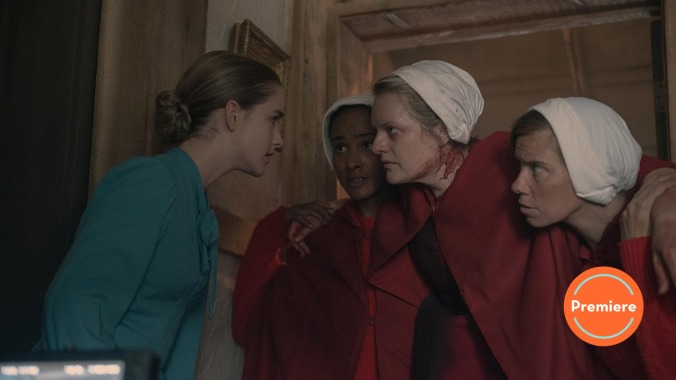After one of the most depressing, grim years of our lifetime that included a global pandemic, social upheaval in the name of justice, crushing economic downfall, and a drawn-out presidential campaign, you might actually be feeling a glimmer of hope. Fear not. The Handmaid’s Tale is here to obliterate any lingering sense of optimism you may have for the world.
We are back in Gilead, baby! And its oppressive, fucked-up, totalitarian, baby-crazed regime. Last time we saw June and her ragtag team of Marthas and rabble-rousing Handmaids, they had managed to pull off a heroic mission involving the transportation of 86 children to the promised land: Canada. It was one of the few moments of victory the show has given us in three seasons, but because that was too generous of a gesture, we are now ready to deal with the aftermath of June’s plot. And it ain’t pretty.
The majority of “Pigs” takes place in one of Mayday’s safe houses in the perpetually gray but bucolic middle of nowhere. The farm appears to function more or less like the female-centered commune many of us have dreamed about after uttering “men are trash”. The renegade Handmaids and Marthas work together to raise the crops, feed the livestock, and regain strength while they figure out their next move. June (Elisabeth Moss) spends days, if not weeks, healing and leaning hard into the cottagecore lifestyle of many an Instagram darling. She tends to her wounds with homemade penicillin made from rotten fruit. She slathers homemade oil on her worn skin. But of course, this isn’t her indulging in some much needed self-care. “Pain makes your world very small,” we hear in a voiceover. “My world can’t be small. Not now. Because the others need me to protect them.” And thus kicks off season four of The Handmaid’s Tale.
The question of protection and how it relates to justice is one of the central themes in this season opener, which is bleak, nerve-wracking, and will make a lot of viewers squirm in their seats. As a result of the flight, Gilead is preparing to invade Canada in retaliation. Aunt Lydia (Ann Dowd) urges the same council that tortured her to hunt down June and bring her to them, for she is the one that led her girls astray. Back in Toronto, Commander Waterford (Joseph Fiennes) warns Sam that the flight will lead to war and June’s death. Obviously, these are the warped interpretations of crime and punishment brought on by the Gilead regime, where the loyal elite view their heinous actions are as righteous.
But the other side is pretty bloodthirsty too, and this is where the question of what constitutes justice gains layers and complexity. The addition of Mrs. Keyes as the teen wife of a decrepit, senile commander hellbent on taking down every single man in Gilead is one of the most unsettling figures this season. The self-described mistress of the safe house and Mayday supporter is so giddy with the thought of more vengeful death—as opposed to a fight for liberation—that it even upsets June, who has her own history of reckless decision-making in the heat of anger. Mckenna Grace offers a performance that is bone-chilling and terrifying, portraying the volatility of a 14-year-old with precision all while making us question whether this girl has any moral compass beyond rage.
This is further complicated when we learn that Commander Keyes, in a desperate attempt to have a baby, offered the teenager to multiple men throughout their marriage, a revelation that comes late in the episode after we’ve been led to believe that Mrs. Keyes might be nothing more than a sadistic June-idolizing girl rebelling. It’s become a bit of a questionable cliché to say “hurt people, hurt people” but in the world of Gilead, this cycle of trauma is alive and well. Hell, it’s the only way to survive.
Pero, like, do we have to go all out problematic? A teen girl wanting to kill one of the men who raped her is understandable. Hell, a grown woman wanting to harm a man who assaulted her is understandable. A grown woman egging a teen girl to butcher one of the men who assaulted her after the woman herself declares him a traitor of the United States and sentences him to death leaves me with, uh, a not-so-fresh feeling. If June was going to act as judge and jury, then why abscond her responsibility as executioner?
We get glimpses of the Hero Myth that is starting to form around June, both from the excitement Mrs. Keyes first greets her with, and June’s own aggrandizing sense of self that she is somehow single-handedly responsible for leading all the Handmaids to safety. (I dunno, this is really more of a team effort.) To give a knife to a child, call her a good girl, and whisper, “make me proud” feels manipulative, even monstrous. It’s not that the guy didn’t “deserve it.” It’s the underlying question of whether there are moral grounds for turning a child into a killer. A DOOZY OF A QUESTION.
And perhaps this is what we’re going to wrestle with throughout the season. As June’s image morphs into that of a dangerous depraved “Delilah” capable of subverting the state (Gilead’s take) or that of a courageous sacrificial guardian angel (Canada’s interpretation), the viewers see the messy totality. We witness the most vulnerable parts of her humanity and her most despicable impulses. We understand her repulsion towards Gilead and her selfish indulgences as a savior. We champion her willingness to say “We are Mayday. We don’t hide. We fight,” and recoil when she adds, “And in this place, we all fight” before urging a teenager to eviscerate—literally—another human.
It’s going to be a dark, dark season. Even by Handmaid’s standards.
Stray observations
- Canada! I love thee! Location of my happy, college years and then later the country my parents called home for half a decade. I get a little thrill whenever Handmaid’s adds a little detail that I feel is oh so Canuck. The Most Canadian Thing to happen this week was Sam asking Serena to please stop smoking inside. We all know we should only smoke right outside the building door, bundled up in Canada Goose parkas and huddled with a grumbling group of Quebecois.
- Eyebrow Watch 2021: Though we barely saw him in season 3, Nick and his lush, thick, unruly eyebrows are back and in full force. I’m still not getting a full read on where his loyalties lie, at least politically speaking. Is Nick a reformed Gilead soldier trying to destroy the system from within? Or are his actions merely motivated by his emotional allegiance to June? Whatever his plan is, it involves rescuing Lawrence from his own death sentence and bringing him back into the government as the scariest creature of all: a consultant.
- Best anachronistic song choice of the episode: Carole King’s version of “Natural Woman,” playing as creepy Mrs. Keyes, dress covered in blood, lies with June in her bed and becomes the big spoon to her little spoon, whispering, “I love you.” If motherhood is the powerful fuel coursing through June’s body, this moment also highlights how our natural instincts to protect the young can turn them into abominations of our own creation.
- R.I.P. to Mr. Darcy, the roly-poly pig whose untimely death is at the center of one of the most disturbing dinner scenes the show has filmed.


